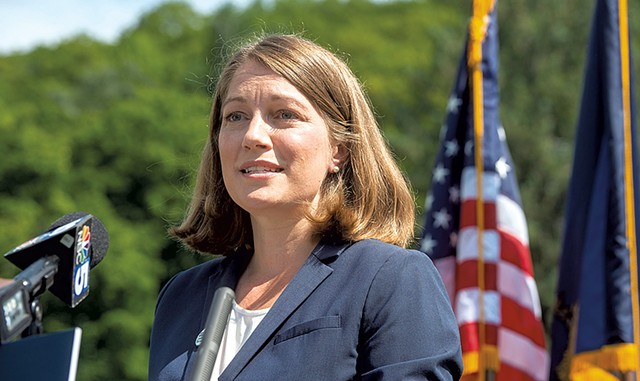
- File: Jeb Wallace Brodeur
- Lt. Gov. Molly Gray
At a debate last month featuring the three leading Democratic candidates for Vermont's lone U.S. House seat, moderator Mike Dougherty asked each whether she would "refuse future donations from registered state and federal lobbyists." The question, at a forum hosted by VTDigger.org, came shortly before the candidates filed reports disclosing money they'd raised during the first quarter of the year.
Lt. Gov. Molly Gray, for one, was forthright.
"I won't here tonight say that I won't accept state or federal lobbyist contributions, but I will be disclosing every dollar," Gray said, "and Vermonters can judge who supports the campaign for themselves."
Two days later, Gray's campaign finance report made clear just how successful she has been in raising cash from federal lobbyists and Beltway insiders.
A Seven Days analysis found that the $628,000 she had raised through March includes tens of thousands of dollars from federal lobbyists who live in Washington, D.C.; Maryland; and Virginia. In fact, she received nearly $100,000 from people who live in the Beltway area — about 16 percent of her donations since her December 6 campaign launch. Her donors include high-profile Washington movers and shakers who have worked for former presidents Bill Clinton and Barack Obama, as well as her former bosses: U.S. Rep. Peter Welch (D-Vt.) and retiring U.S. Sen. Patrick Leahy (D-Vt).
Gray received money from lobbyists who have represented telecom giants including Verizon, AT&T, Samsung, Comcast, and T-Mobile, plus tech behemoths Oracle, Amazon, Google, Facebook/Meta and Microsoft. Several lobbyists for defense contractors donated, as well as some who have represented pharmaceutical companies such as Horizon Therapeutics, Bayer, Catalent, Pfizer, Novartis and GlaxoSmithKline.
The donor list solidifies Gray's position as the establishment pick in what is expected to be the marquee Vermont race of the 2022 campaign season, with a slate of Democratic women vying to become the first of their gender to represent the state in Washington. While Gray has highlighted her childhood growing up on a Newbury farm, the list shows that she is comfortable asking for money in the Beltway world.
"She just called me out of the blue one day," lobbyist Nathan Daschle, the son of former Democratic Senate majority leader Tom Daschle, told Seven Days in an email. He counts 3M, Berkshire Hathaway Energy and Toyota as recent clients, records show. "She introduced herself and talked a little about the campaign, and I was impressed with her. I also appreciated that she wasn't running as the candidate of the far left."
Gray asked for a donation, and Daschle, president of the Daschle Group, gave her $2,900, the max allowed for the primary election cycle.
Gray's supporters say her D.C. haul is a product of the relationships she formed while working on Capitol Hill. Those connections actually began in Vermont in 2005, when Gray interned in Leahy's Burlington office. The next year, she worked on Welch's winning campaign and moved to D.C. to take a job on his staff.
From 2008 to 2011, Gray was a congressional affairs associate for the International Committee of the Red Cross. She worked with various congressional committees and led delegations on trips to developing countries "to promote greater understanding of and support for the ICRC's work globally," according to Gray's campaign manager, Samantha Sheehan.
Asked about Gray's D.C.-area haul, Sheehan cited the "large 'Vermont diaspora'" there, as well as the many people with whom Gray worked while at the Red Cross.
"Her diverse support reflects that people know she will be ready to hit the ground running as an effective first congresswoman for Vermont," Sheehan said.
The other two top contenders for Vermont's U.S. House seat raised far less from Beltway denizens: Vermont Sen. Kesha Ram Hinsdale (D-Chittenden) brought in about $40,000, while state Senate President Pro Tempore Becca Balint (D-Windham) raised about $22,400.
Overall, Gray has so far raised about 49 percent of her total haul from donors with out-of-state addresses. For Balint, that figure was 41 percent; for Ram Hinsdale, about 47 percent.
The next finance reports are due July 15.
Aside from briefly working for Leahy, Gray has another tie to Vermont's senior senator: Her uncle, the late Bill Gray, was a politician and a close friend of Leahy's.
Molly Gray's success among D.C.-area donors is noteworthy for a first-time candidate for federal office. It offers a peek into Leahy's sphere of influence as he closes out a 48-year Senate career.
At least 15 of Gray's Beltway-area donors are current or former Leahy staffers, and many others have connections to senators in his orbit or did work for the various committees he's served on. Although Leahy does not plan to endorse a candidate in the House primary, his daughter, Alicia Leahy, a lobbyist for the Motion Picture Association of America, gave Gray $250.
Lobbyists Luke Albee, Ed Pagano and Marla Grossman — all former Leahy staffers — hosted D.C. fundraisers for Gray in March, and the three donated a combined $4,650 to her campaign.
In an interview, Albee described his backyard event as low-key, featuring "pizza and Costco kale salad and beer."
"And a lot of the folks you see on that report came because ... Molly's the one candidate who worked in D.C. and who really left a mark," said Albee, who served as Leahy's chief of staff from 1993 to 2005. By his count, some 20 people who served as chiefs of staff for members of Congress or Democratic presidents have donated to Gray.
Albee noted that first-year members of Congress hold little sway.
"If you want to give donations to peddle influence," Albee said, "this isn't the race to start at."
Another lobbyist donor, Will Todd of Cornerstone Government Affairs, previously worked as a staffer on the U.S. Senate Committee on Appropriations. Todd donated $2,000, plus a $200 in-kind donation for a venue rental for a fundraising event. (Gray worked with Todd — "and other congressional staff" — during her time at the International Committee of the Red Cross, Sheehan noted).
"The thing about Sen. Leahy is, he does, and always has, encouraged political activism among his staff," said Carolyn Dwyer, Leahy's longtime campaign spokesperson. She hired Gray to work on Welch's campaign in 2006 and has been a mentor to her since then. "And so it really shouldn't be a surprise to people that so many of them are politically engaged, either while they're still working for him or once they've left his staff."
Outside of D.C., big Democrat donors have also joined Team Molly. Julie Packard, daughter of the cofounder of Hewlett-Packard and a conservationist and philanthropist, gave Gray $2,900. Andrew McCollum, a San Francisco-based angel investor and entrepreneur who cofounded Facebook, gave $5,800, as did Karla Jurvetson, a physician, philanthropist, and longtime Democratic activist and donor who gave nearly $15 million to Sen. Elizabeth Warren's (D-Mass.) failed 2020 presidential campaign. Massachusetts-based Democratic mega-donors Nancy and Renier Beeuwkes each donated $5,800. (Donations in excess of $2,900 cannot be used until the general election.)
"This race is on everybody's screen because it's so rare that there are open seats in the Vermont federal delegation," Albee said.
Federal candidates must disclose the names of contributors who give more than $200 each cycle. Gray's campaign was the only one in the race to publicly itemize all donations, including the smallest ones. Balint and Ram Hinsdale later shared their full donor lists with Seven Days. They also received money from lobbyists, though far less than Gray.
A fourth Democratic candidate who attended the debate, Sianay Chase Clifford, reported raising about $7,350 in the first quarter, though she only launched her campaign in mid-March. A fifth candidate, Dr. Louis Meyers, didn't file a first-quarter campaign finance report.
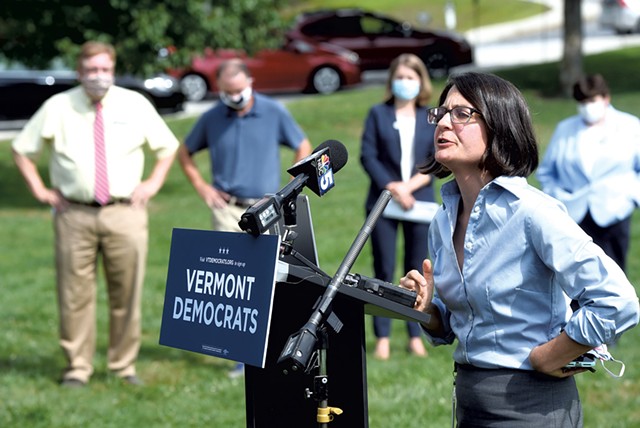
- File: Jeb Wallace Brodeur
- State Senate President Pro Tempore Becca Balint
Balint, who at the April debate said she was unclear whether lobbyists had donated to her campaign, acknowledged in an email to Seven Days last week that some had. She also noted that, "for the first time in my political career ... I don't personally know everyone who's giving me money."
"I will continue to accept donations from individuals and organizations that support my policy positions and believe in me and my approach to solving the challenges we face," she said.
Ram Hinsdale raised about $40,000 of her $444,000 campaign chest from donors in the D.C. area, or about 9 percent. Among them were Stephanie Peters ($500), a lobbyist for Microsoft; Miya Patel ($250), a lobbyist who's worked for Tesla, Airbnb, Lyft and Google; software company executive Valerie Singer ($500); Celinda Lake ($1,250), a Democratic consultant and pollster; Shekar Narasimhan ($2,900), the chair and founder of the AAPI Victory Fund, a super PAC that supports Asian American and Pacific Islander candidates; Sheila Johnson ($5,800), the CEO of Salamander Hotels & Resorts; Benjamin Webb ($5,800), a software developer with the Lincoln Institute of Land Policy; and Seema Nanda ($1,000), a former CEO of the Democratic National Committee who heads the solicitor's office in the U.S. Department of Labor.
"Progressives everywhere are rallying to send me to Congress and it's inspiring," Ram Hinsdale said in an email. "They see the leadership opportunity coming out of Vermont and they want to support it."
Balint brought in more than $22,000 of her $569,000 haul from D.C.-area donors, about 4 percent. Among them were Megan Hull ($2,900), a philanthropist known for donating to Democrats and progressive causes; and two lobbyists who also champion LGBTQ causes: Mary Beth Stanton ($1,000), who has represented defense contractor Raytheon Technologies, Home Depot, Toyota and student loan company Navient; and John Michael González ($1,500), who has represented Qualcomm and Microsoft, plus pharmaceutical companies such as Takeda, Merck and Amgen. J.W. "Joey" Kaempfer Jr., a D.C.-area developer and major Democratic donor, gave $1,000.
"I am so grateful to all of the people across Vermont and across the country who have donated to my campaign," Balint said in an email.
All three candidates have sworn off corporate political action committee money, but they all are accepting donations from special interest PACs. Balint, who seeks to become the first openly gay member of Congress from Vermont, took in $24,400 from D.C.-based PACs, including Equality PAC and the LGBTQ Victory Fund.
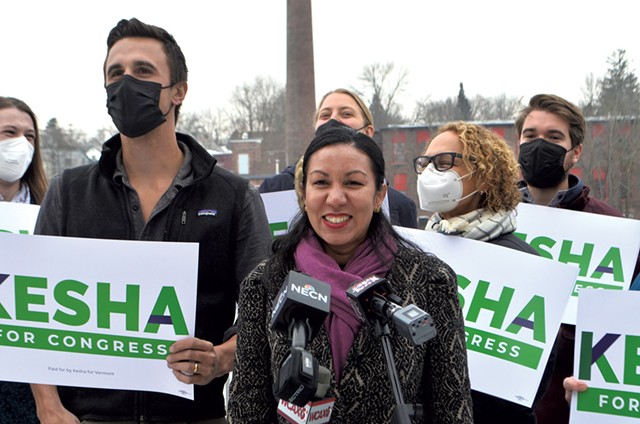
- Sasha Goldstein ©️ Seven Days
- State Sen. Kesha Ram Hinsdale
Ram Hinsdale, who is of Jewish and South Asian descent, has made a point of emphasizing her support and endorsements from labor unions. She received $22,500 from D.C.-based PACs, including the National Rural Letter Carriers' Association PAC and the Indian American Impact Fund.
Gray took in about $11,000 from D.C.-based PACs, including the American Association for Justice PAC and the Carpenters Legislative Improvement Committee United Brotherhood of Carpenters and Joiners. She also received $5,000 from a Minnesota-based PAC, American Crystal Sugar Company, a cooperative of sugar beet farmers that gives money to candidates of all parties.
Gray's Leahy and Welch connections, though, have proven the most fruitful for her Beltway fundraising. And she's seized opportunities to emphasize her links to — and admiration for — two of Vermont's most popular and powerful politicians.
At the end of last month's debate, Digger moderators asked the four candidates to name a "U.S. politician, living or dead, whose political values come closest to reflecting your own policy decisions."
Ram Hinsdale named U.S. Rep. Pramila Jayapal (D-Wash.), a progressive who represents most of Seattle and endorsed Ram Hinsdale last week. Both Balint and Chase Clifford named the late Shirley Chisholm, the first Black woman elected to Congress and later a candidate for president. Chase Clifford also mentioned the progressive U.S. Rep. Cori Bush (D-Mo.)
Gray was the last to answer.
"I guess two people I think are Vermont and U.S. treasures," she said, "people I've worked for: Sen. Leahy and Congressman Welch."
Chelsea Edgar contributed reporting.
Gray's D.C. Donors
Nearly 200 people from the D.C. area have donated to the U.S. House campaign of Lt. Gov. Molly Gray. They include:
Former U.S. Sen. Patrick Leahy (D-Vt.) aide John Podesta ($500), a Washington insider who served as president Bill Clinton's chief of staff and advised president Barack Obama. Podesta was also chair of Hillary Clinton's failed 2016 run for president.
Martin Franks ($1,250), a former Leahy chief of staff who went on to serve as a top lobbyist for CBS. His wife, Sherry, gave $250.
Karen Dunn ($250), an attorney for former president Obama and a star litigator who has represented Oracle, Facebook, Apple, Uber and SolarCity, a company now owned by Tesla.
Steven Elmendorf ($1,000), a high-profile Washington lobbyist who was chief of staff to former U.S. House speaker Dick Gephardt and worked on multiple presidential campaigns.
Chris Putala ($1,000), a lobbyist and former aide to President Joe Biden when he served on the Senate Judiciary Committee.
Lobbyist Jeff RiCchetti, whose brother Steve is a top Biden aide, gave $500.
Michael Smith ($500), who has been "recognized by various publications as a 'Top Hired Gun,' a 'Top Corporate Lobbyist,' and a leading Democratic fundraiser," according to the website of his company, Cornerstone Government Affairs.
Leslie Dach ($500), who served with Podesta in the Clinton White House and later joined Walmart, where he helped rebrand the company. He also served in the Obama administration and as a temporary adviser in the Biden administration.
Gregory Craig ($1,500), a powerful Washington lawyer with Vermont ties who worked for both the Clinton and Obama administrations.
William Goodman ($3,000), lobbyist at government contractor Applied Research Associates, served as senior defense adviser to Leahy and worked in the Office of the Secretary of Defense.
Todd Stern ($250), the former U.S. Special Envoy for Climate Change who helped negotiate the Paris Climate Accord in 2015.
Judith McHale ($1,000), former CEO of Discovery Communications, served as under secretary of state for public diplomacy and public affairs under Obama.
Thomas "Mack" McLarty ($2,900), former chief of staff to president Clinton, cofounded McLarty Associates, an international trade consultancy. His cofounder, Nelson Cunningham ($2,000), also worked in the Clinton White House and, in the 1990s, as general counsel for the Senate Judiciary Committee.
Clarification, May 19, 2022: Gray lived on Q Street in D.C., not Capitol Hill.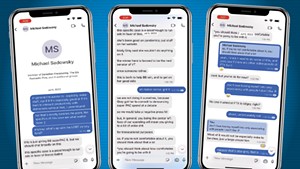
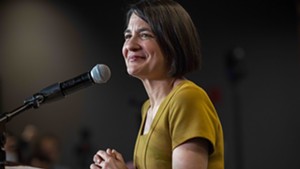
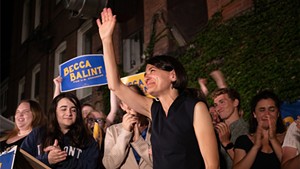
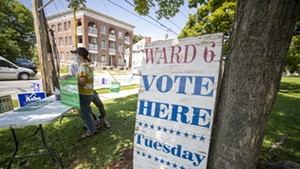










Comments
Comments are closed.
From 2014-2020, Seven Days allowed readers to comment on all stories posted on our website. While we've appreciated the suggestions and insights, right now Seven Days is prioritizing our core mission — producing high-quality, responsible local journalism — over moderating online debates between readers.
To criticize, correct or praise our reporting, please send us a letter to the editor or send us a tip. We’ll check it out and report the results.
Online comments may return when we have better tech tools for managing them. Thanks for reading.